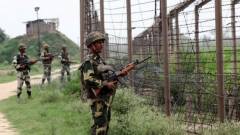In his first extensive comments on the violence, Modi told a political rally on Thursday – when 1,000 Indian mortars rained across into Pakistan
To judge from the shrill outrage of India’s TV news channels, the past week’s bloody clashes along the border dividing Kashmir are all Pakistan’s fault: one network has been plugging the Twitter hashtag #PakBorderDare.
However, military officers in both countries and officials in New Delhi say the violence that has killed nearly 20 civilians escalated because of a more assertive Indian posture under the new government of nationalist Prime Minister Narendra Modi.
“The message we have been given from the prime minister’s office is very clear and precise,” said a senior Indian Home Ministry official. “The prime minister’s office has instructed us to ensure that Pakistan suffers deep and heavy losses.”
In his first extensive comments on the violence, Modi told a political rally on Thursday – when 1,000 Indian mortars rained across into Pakistan – that “it is the enemy that is screaming.”
“The enemy has realised that times have changed and their old habits will not be tolerated,” he said.
The exchange of mortar and gunfire across a populated border area of Jammu, in the lowlands of Kashmir, has been India’s most serious brush with Pakistan in a decade.
Almost 20,000 Indian civilians have fled their homes to escape the fighting, taking refuge in schools and relief camps.
The guns fell quiet on Friday, hours before the Nobel committee named an Indian child rights crusader and Pakistan’s teenage education activist Malala Yousafzai as this year’s Peace Prize winners. But heavy firing resumed on Saturday And continued into the early hours of Sunday.
Modi’s robust approach towards Pakistan, supporters say, is aimed at emphasising India’s superior strength and making Pakistan’s military think twice before firing across the border.
It is a strategy he also used to stand up to India’s larger neighbour, China, during a border standoff between several hundred Indian and Chinese troops on the Tibetan plateau that coincided with President Xi Jinping’s visit to New Delhi last month.
But the new stance risks more violence in the Himalayan region of Kashmir, already one of the world’s most volatile fault lines, and has eroded a border truce that has largely held between India and Pakistan since 2003.
The nuclear-armed rivals have fought two of their three wars since independence in 1947 over Kashmir, which is divided between them and claimed in full by both.
Since Modi’s election victory in May, military commanders have been encouraged to step up border patrols and retaliate with more force if they come under attack. New Delhi has insisted there can be no talks with Pakistan unless it ends shootings and pushing militants into the Indian side of Kashmir.
“This is what we feared would happen if Modi came to power,” said Ikram Sehgal, a former Pakistani military officer and chairman of one of the country’s largest security companies.
“This could easily escalate into something that won’t be good for Pakistan or India.”
Source: Dhaka Tribune








